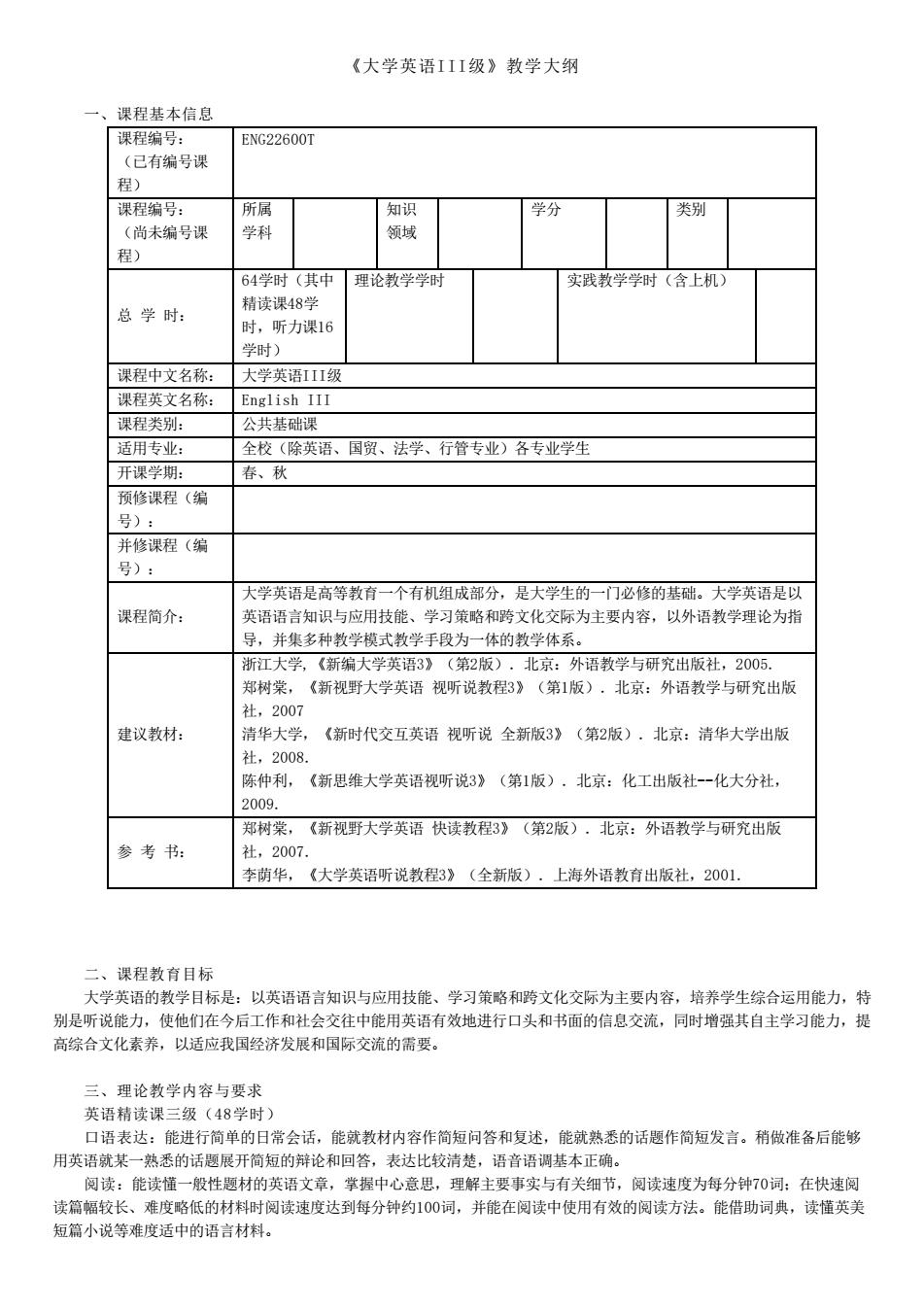
《大学英语III级》教学大纲 ,、课得基木信息 课得编号: ENG22600T (已有编号课 课程编号: 所属 知识 学分 类别 (尚未编号课 学科 领域 程) 64学时(其中理论教学学时 实践教学学时(含上机) 精读课48学 总学时: 时,听力课1 学时) 课程中文名称: 大学英语11山乳 课程英文名称:Eng1 ish III 课程类别: 公共基础课 话用专业: 全校(除英语、国贸、法学、行管专业)各专业学生 开课学期 春、秋 预修课程(编 号): 并修课程(编 号): 大学英语是高竿教育一一个有机组成部分.是大学生的一门必修的基出。大学英语是以 课程简介: 英语语言知识与应用技能、学习策略和跨文化交际为主要内容,以外语教学理论为指 导,并集多种教学模式教学手段为一体的教学体系 浙江大学,《新编大学英语3》(第2版)·北京:外语教学与研究出版社,2005, 郑树棠,《新视野大学英语视听说教程3》(第1板),北京:外语教学与研究出枢 社,2007 建议教材: 清华大学,《新时代交互英语规听说全新版3》(第2版),北京:清华大学出版 社,2008. 陈仲利,《新思维大学英语视听说3》(第1版)·北京:化工出版社-一化大分社 2009. 郑树案 《新视野大学英语快读教程3》(第2版)·北京:外语教学与研究出版 参考书: 2007 李萌华,《大学英语听说教程3》(全新版),上海外语教有出版社,2001. 二、课程教育目标 大学英语的教学目标是:以英语语言知识与应用技能、学习策略和跨文化交际为主要内容,培养学生综合运用能力,特 别是听说能力,使他们在今后工作和社会交往中能用英语有效地进行口头和书面的信息交流,同时增强其自主学习能力,提 高综合文化素养,以适应我国经济发展和国际交流的需要。 三、理论教学内容与要求 英语精读课三级(48学时) 口语表达:能进行简单的日常会话,能就教材内容作简短问答和复述,能就熟悉的话题作简短发言。稍做准备后能够 用英语就某一熟悉的话题展开简短的辩论和 答,表达比较清楚,语音 调基本正确 阅读 :能读懂 是中心意思, 理解主要事实与有关细节 阅读速度为每分钟70词:在快速阅 读篇幅较长 难度略低 材的英语文章, 的材料时阅读速度达到每分钟约100词,并能在阅读中使用有效的阅读方法。能借助词典,读懂英关 短篇小说等难度适中的语言材料
《大学英语III级》教学大纲 一、课程基本信息 课程编号: (已有编号课 程) ENG22600T 课程编号: (尚未编号课 程) 所属 学科 知识 领域 学分 类别 总 学 时: 64学时(其中 精读课48学 时,听力课16 学时) 理论教学学时 实践教学学时(含上机) 课程中文名称: 大学英语III级 课程英文名称: English III 课程类别: 公共基础课 适用专业: 全校(除英语、国贸、法学、行管专业)各专业学生 开课学期: 春、秋 预修课程(编 号): 并修课程(编 号): 课程简介: 大学英语是高等教育一个有机组成部分,是大学生的一门必修的基础。大学英语是以 英语语言知识与应用技能、学习策略和跨文化交际为主要内容,以外语教学理论为指 导,并集多种教学模式教学手段为一体的教学体系。 建议教材: 浙江大学,《新编大学英语3》(第2版).北京:外语教学与研究出版社,2005. 郑树棠,《新视野大学英语 视听说教程3》(第1版).北京:外语教学与研究出版 社,2007 清华大学,《新时代交互英语 视听说 全新版3》(第2版).北京:清华大学出版 社,2008. 陈仲利,《新思维大学英语视听说3》(第1版).北京:化工出版社--化大分社, 2009. 参 考 书: 郑树棠,《新视野大学英语 快读教程3》(第2版).北京:外语教学与研究出版 社,2007. 李荫华,《大学英语听说教程3》(全新版).上海外语教育出版社,2001. 二、课程教育目标 大学英语的教学目标是:以英语语言知识与应用技能、学习策略和跨文化交际为主要内容,培养学生综合运用能力,特 别是听说能力,使他们在今后工作和社会交往中能用英语有效地进行口头和书面的信息交流,同时增强其自主学习能力,提 高综合文化素养,以适应我国经济发展和国际交流的需要。 三、理论教学内容与要求 英语精读课三级(48学时) 口语表达:能进行简单的日常会话,能就教材内容作简短问答和复述,能就熟悉的话题作简短发言。稍做准备后能够 用英语就某一熟悉的话题展开简短的辩论和回答,表达比较清楚,语音语调基本正确。 阅读:能读懂一般性题材的英语文章,掌握中心意思,理解主要事实与有关细节,阅读速度为每分钟70词;在快速阅 读篇幅较长、难度略低的材料时阅读速度达到每分钟约100词,并能在阅读中使用有效的阅读方法。能借助词典,读懂英美 短篇小说等难度适中的语言材料
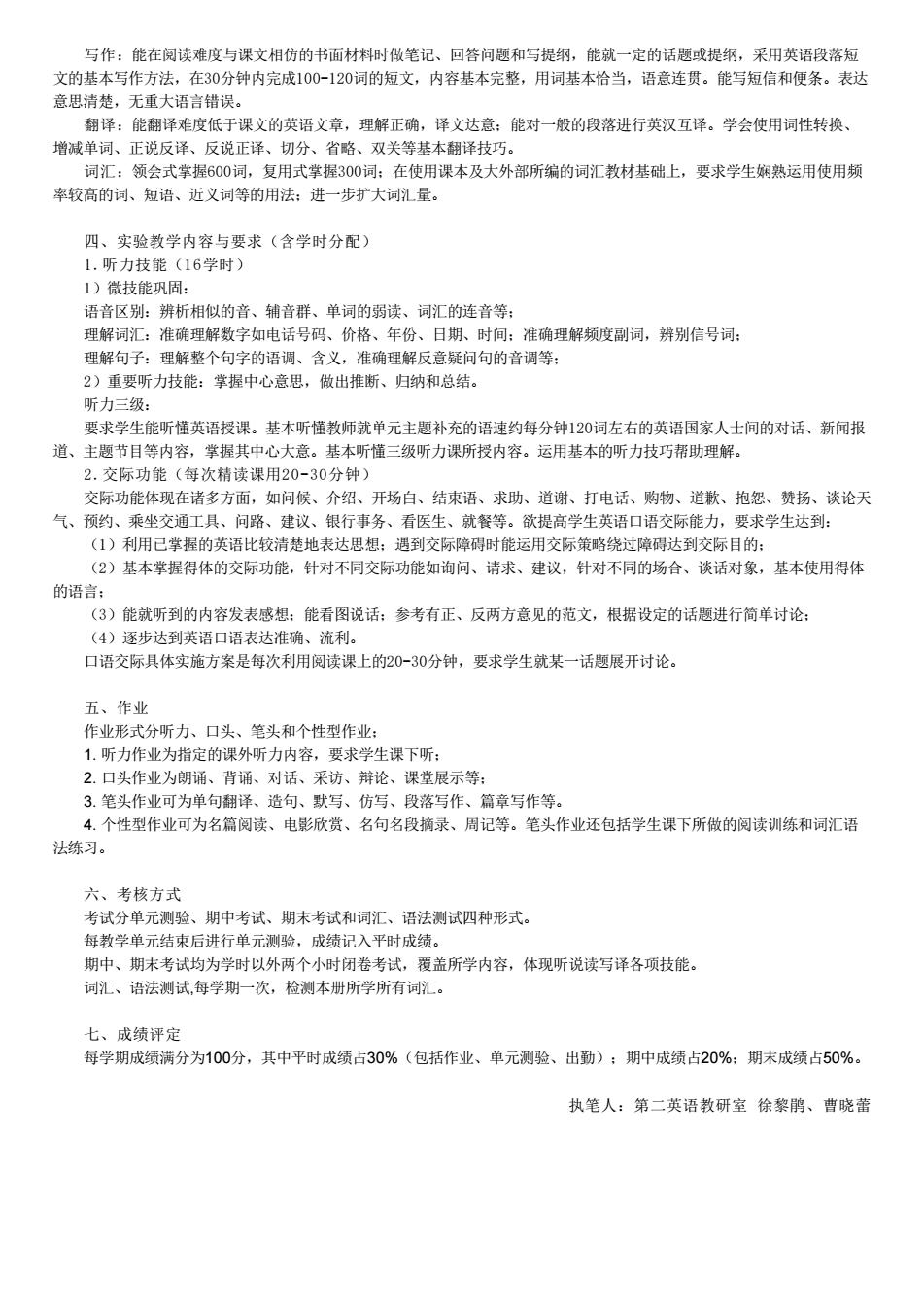
写作:能在阅读难度与课文相仿的书面材料时做笔记、回答问题和写提纲,能就一定的话题或提纲,采用英语段落短 文的基本写作方法,在30分钟内完成100-120词的短文,内容基本完整,用词基本恰当,语意连贯。能写短信和便条。表达 意思清楚,无重大语言错误。 翻译:能翻译难度低于课文的英语文章,理解正确,译文达意:能对一般的段落进行英汉互译。学会使用词性转换、 增减单词、正说反译、反说正译、切分、省略、双关等基本翻译技巧。 词汇:领会式学指600词,复用式掌300词:在使用课本及大外部所编的词汇教材基础上,要求学生娴熟运用使用频 率较高的词、短语、近义词等的用法:进一步扩大词汇量。 四、实验教学内容与要求(含学时分配〉 1.听力技能(16学时) 1)微技能巩固: 语音区别:辨析相似的音、辅音群、单词的弱读、词汇的连音等: 理解词汇:准确理解数字如电话号码、价格、年份、日期、时间:准确理解频度副词,辨别信号词: 理解句子:理解整个句字的语调、含义,准确理解反意疑问句的音调等: 2)重要听力技能:学握中心意思,做出推断、归纳和总结。 要求学生能听懂英语授课。 基本听懂教师就单元主题补充的语速约每分钟120词左右的英语国家人士间的对话、新闻 道、主题节目等内容 茅指其中心大意。基木听懂三级所力课所授内容。运用基木的所力技巧帮助理解。 2.交际功能(每次精读课用20-30分钟) 交际功能体现在诸多方面,如问候、介绍、开场白、结束语、求助、道谢、打电话、购物、道歉、抱怨、赞扬、谈论天 气、预约、乘坐交通工具、问路、建议、银行事务、看医生、就餐等。欲提高学生英语口语交际能力,要求学生达到: (1)利用已掌握的英语比较清楚地表达思想:遇到交际障碍时能运用交际策略绕过障碍达到交际目的: (2)基本掌握得体的交际功能,针对不同交际功能如询问、请求、建议,针对不同的场合、谈话对象,基本使用得体 的语言 (3)能就听到的内容发表感想:能看图说话:参考有正、反两方意见的范文,根据设定的话题进行简单讨论: 五、作业 作业形式分听力、口头、笔头和个性型作业: 1.听力作业为指定的课外听力内容,要求学生课下听: 2.口头作业为朗诵、背诵、对话、采访、辩论、课堂展示等: 3.笔头作业可为单句翻译、造句、默写、仿写、段落写作、篇章写作等。 4.个性型作业可为名篇阅读、电影欣赏、名句名段摘录、周记等。笔头作还句括学生课下所做的阅读测练和词汇语 法练习。 每教学单元结束后进行单元测验,成绩记入平时成绩。 期中、期末考试均为学时以外两个小时闭卷考试,覆盖所学内容,体现听说读写译各项技能。 词汇、语法测试,每学期一次,检测本册所学所有词汇。 七、成绩评定 每学期成绩满分为100分,其中平时成绩占30%(包括作业、单元测验、出勤):期中成绩占20%:期末成绩占50%。 执笔人:第二英语教研室徐黎鹃、曹晓苗
写作:能在阅读难度与课文相仿的书面材料时做笔记、回答问题和写提纲,能就一定的话题或提纲,采用英语段落短 文的基本写作方法,在30分钟内完成100-120词的短文,内容基本完整,用词基本恰当,语意连贯。能写短信和便条。表达 意思清楚,无重大语言错误。 翻译:能翻译难度低于课文的英语文章,理解正确,译文达意;能对一般的段落进行英汉互译。学会使用词性转换、 增减单词、正说反译、反说正译、切分、省略、双关等基本翻译技巧。 词汇:领会式掌握600词,复用式掌握300词;在使用课本及大外部所编的词汇教材基础上,要求学生娴熟运用使用频 率较高的词、短语、近义词等的用法;进一步扩大词汇量。 四、实验教学内容与要求(含学时分配) 1.听力技能(16学时) 1)微技能巩固: 语音区别:辨析相似的音、辅音群、单词的弱读、词汇的连音等; 理解词汇:准确理解数字如电话号码、价格、年份、日期、时间;准确理解频度副词,辨别信号词; 理解句子:理解整个句字的语调、含义,准确理解反意疑问句的音调等; 2)重要听力技能:掌握中心意思,做出推断、归纳和总结。 听力三级: 要求学生能听懂英语授课。基本听懂教师就单元主题补充的语速约每分钟120词左右的英语国家人士间的对话、新闻报 道、主题节目等内容,掌握其中心大意。基本听懂三级听力课所授内容。运用基本的听力技巧帮助理解。 2.交际功能(每次精读课用20-30分钟) 交际功能体现在诸多方面,如问候、介绍、开场白、结束语、求助、道谢、打电话、购物、道歉、抱怨、赞扬、谈论天 气、预约、乘坐交通工具、问路、建议、银行事务、看医生、就餐等。欲提高学生英语口语交际能力,要求学生达到: (1)利用已掌握的英语比较清楚地表达思想;遇到交际障碍时能运用交际策略绕过障碍达到交际目的; (2)基本掌握得体的交际功能,针对不同交际功能如询问、请求、建议,针对不同的场合、谈话对象,基本使用得体 的语言; (3)能就听到的内容发表感想;能看图说话;参考有正、反两方意见的范文,根据设定的话题进行简单讨论; (4)逐步达到英语口语表达准确、流利。 口语交际具体实施方案是每次利用阅读课上的20-30分钟,要求学生就某一话题展开讨论。 五、作业 作业形式分听力、口头、笔头和个性型作业; 1. 听力作业为指定的课外听力内容,要求学生课下听; 2. 口头作业为朗诵、背诵、对话、采访、辩论、课堂展示等; 3. 笔头作业可为单句翻译、造句、默写、仿写、段落写作、篇章写作等。 4. 个性型作业可为名篇阅读、电影欣赏、名句名段摘录、周记等。笔头作业还包括学生课下所做的阅读训练和词汇语 法练习。 六、考核方式 考试分单元测验、期中考试、期末考试和词汇、语法测试四种形式。 每教学单元结束后进行单元测验,成绩记入平时成绩。 期中、期末考试均为学时以外两个小时闭卷考试,覆盖所学内容,体现听说读写译各项技能。 词汇、语法测试,每学期一次,检测本册所学所有词汇。 七、成绩评定 每学期成绩满分为100分,其中平时成绩占30%(包括作业、单元测验、出勤);期中成绩占20%;期末成绩占50%。 执笔人:第二英语教研室 徐黎鹃、曹晓蕾
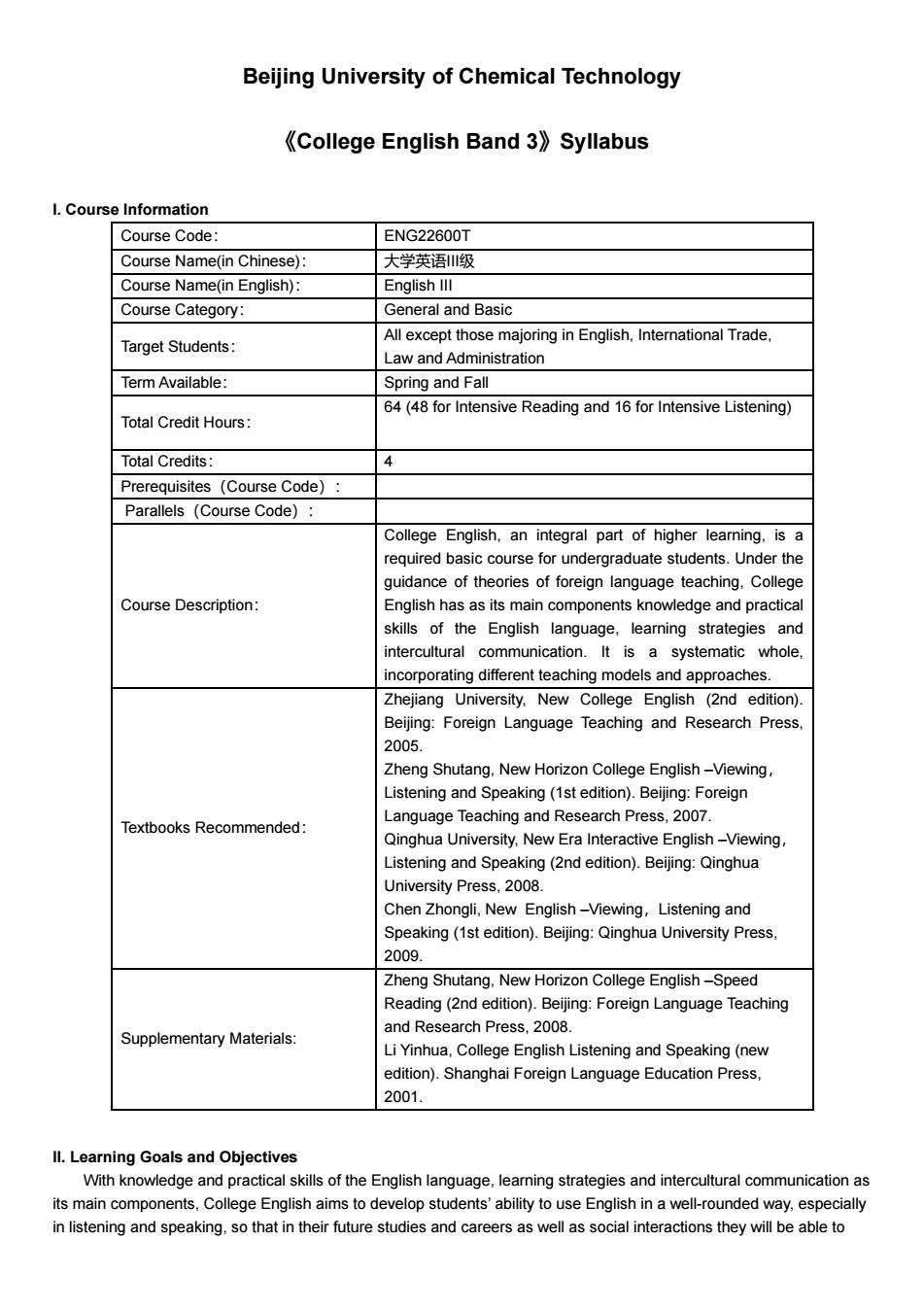
Beijing University of Chemical Technology 《College English Band3》Syllabus I.Course Information Course Code: FNG22600T Course Name(in Chinese): 大学英语川川级 Course Name(in English): English ll Course Category: General and Basic Target Students: All except those majoring in English.International Trade. Law and Administration Term Available: Spring and fall 64(48 for Intensive Reading and 16 for Intensive Listening) Total Credit Hours: Total Credits: y Prerequisites (Course Code): Parallels (Course Code): College English,an integral part of higher learning,is a required basic course for underaraduate students Under the quidance of theories of foreian lanquage teaching.college Course Description: Enalish has as its main comp ents knowledge and practica skills of the English lang ning stra 9 whole incorporating different teaching models and approaches. Zhejiang University.New College English (2nd edition). Beijing:Foreign Language Teaching and Research Press 2005. Zheng Shutang.New Horizon College English-Viewing Listening and Speaking(1st edition).Beijing:Foreign Textbooks Recommended Lanquage Teaching and Research Press.2007. Qinghua University.New Era nte ive English-Viewing Lis stening and Speaking ().Bejing:Qinghua University Pres ,200E Chen Zhongli,New English-Viewing,Listening and Speaking(1st edition).Beijing:Qinghua University Press. 2009. Zheng Shutang,New Horizon College English-Speed Reading(2nd edition).Beijing:Foreign Language Teaching and res earch Press 2008 Supplementary Materials Yinhua colle eEnglish Listening and Speaking (nev n).Shanghai Foreign Language Education Press, 2001 ll.Learning Goals and Objectives With knowledge and practical skills of the English language,learning strategies and intercultural communication as its main components.College English aims to develop students'ability to use English in a well-rounded way.especially in listening and speaking.so that in their future studies and careers as well as social interactions they will be able to
Beijing University of Chemical Technology 《College English Band 3》Syllabus I. Course Information Course Code: ENG22600T Course Name(in Chinese): 大学英语III级 Course Name(in English): English III Course Category: General and Basic Target Students: All except those majoring in English, International Trade, Law and Administration Term Available: Spring and Fall Total Credit Hours: 64 (48 for Intensive Reading and 16 for Intensive Listening) Total Credits: 4 Prerequisites(Course Code): Parallels(Course Code): Course Description: College English, an integral part of higher learning, is a required basic course for undergraduate students. Under the guidance of theories of foreign language teaching, College English has as its main components knowledge and practical skills of the English language, learning strategies and intercultural communication. It is a systematic whole, incorporating different teaching models and approaches. Textbooks Recommended: Zhejiang University, New College English (2nd edition). Beijing: Foreign Language Teaching and Research Press, 2005. Zheng Shutang, New Horizon College English –Viewing, Listening and Speaking (1st edition). Beijing: Foreign Language Teaching and Research Press, 2007. Qinghua University, New Era Interactive English –Viewing, Listening and Speaking (2nd edition). Beijing: Qinghua University Press, 2008. Chen Zhongli, New English –Viewing,Listening and Speaking (1st edition). Beijing: Qinghua University Press, 2009. Supplementary Materials: Zheng Shutang, New Horizon College English –Speed Reading (2nd edition). Beijing: Foreign Language Teaching and Research Press, 2008. Li Yinhua, College English Listening and Speaking (new edition). Shanghai Foreign Language Education Press, 2001. II. Learning Goals and Objectives With knowledge and practical skills of the English language, learning strategies and intercultural communication as its main components, College English aims to develop students’ ability to use English in a well-rounded way, especially in listening and speaking, so that in their future studies and careers as well as social interactions they will be able to
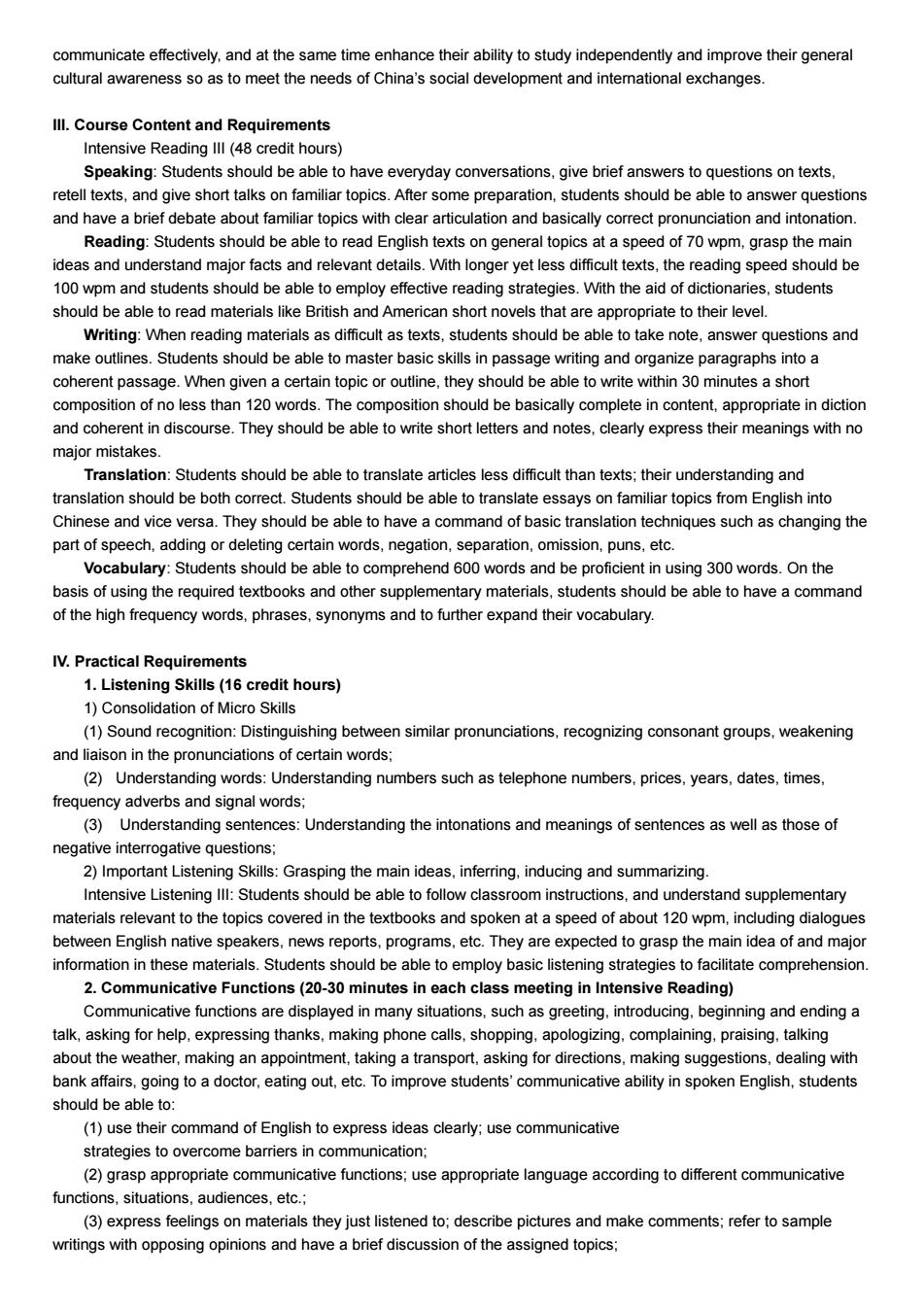
communicate effectively,and at the same time enhance their ability to study independently and improve their general cultural awareness so as to meet the needs of China's social development and intemational exchanges. Ill.Course Content and Requirements Intensive Reading Ill(48 credit hours) uld he able to have tions on texts 四第器b恤 and have a brie cally correct pronunciation and intonatior Reading:Students should be able to read English texts on general topics at a speed of 70 wpm.grasp the mair ideas and understand major facts and relevant details.With longer yet less difficult texts.the reading speed should be 100 wpm and students should be able to employ effective reading strategies.With the aid of dictionaries,students should be able to read materials like British and American short novels that are appropriate to their level. Writing:When reading materials as difficult as texts,students should be able to take note,answer questions and make outlines.Students should be able to master basic skills in passage writing and organize paragraphs into a coherent passage.When given a certain topic or outline,they should be able to write v ithin 30 minutes a short n of no less thar mposition s nould be basically complete in content appropriate in diction write hor ltters and notes.clearly express their meanings withno major mistak Translation:Students should be able to translate articles less difficult than texts:their understanding and translation should be both correct.Students should be able to translate essays on familiar topics from English into Chinese and vice versa.They should be able to have a command of basic translation techniques such as changing the part of speech,adding or deleting certain words.negation.separation.omission.puns.etc. Vocabulary:Students should be able to comprehend 600 words and be proficient in using 300 words.On the basis of using the required textbooks and other supplementary materials,students should be able to have a command of the high fre rds phrases synonyms and to further expand their vocabulary. IV.Practical Requi (16 credit hours) 1)Consolidation of Micro Skills (1)Sound recognition:Distinguishing between similar pronunciations.recognizing consonant groups,weakening and liaison in the pronunciations of certain words: (2)Understanding words:Understanding numbers such as telephone numbers.prices.years,dates,times. frequency adverbs and signal words: (3)Understanding sentences:Understanding the intonations and meanings of sentences as well as those of e inte n g:Students shou be able to follow classroom instruction srelevant to the topics covered in the txboand spoken at a speed of about 120 wpm.in uding dialogues between English native speakers,news reports,programs,etc.They are expected to grasp the main idea of and major information in these materials.Students should be able to employ basic listening strategies to facilitate comprehension. 2.Communicative Functions(20-30 minutes in each class meeting in Intensive Reading) Communicative functions are displayed in many situations,such as greeting.introducing.beginning and ending a talk,asking for help,expressing thanks,making phone calls,shopping,apologizing,complaining.praising,talking about the weather.making an appointment.taking a transport.asking for directions.making suggestions.dealing with bank affairs o ongoadoctoreatingouteteTomprovestdens ommunicative ability in spoken English.students (1)use their command of English to express ideas clearly:use communicative strategies to overcome bamers (2)grasp appropriate communicative functions;use appropriate language according to different communicative functions.situations.audiences.etc. (3)express feelings on materials they just listened to:describe pictures and make comments:refer to sample writings with opposing opinions and have a brief discussion of the assigned topics:
communicate effectively, and at the same time enhance their ability to study independently and improve their general cultural awareness so as to meet the needs of China’s social development and international exchanges. III. Course Content and Requirements Intensive Reading III (48 credit hours) Speaking: Students should be able to have everyday conversations, give brief answers to questions on texts, retell texts, and give short talks on familiar topics. After some preparation, students should be able to answer questions and have a brief debate about familiar topics with clear articulation and basically correct pronunciation and intonation. Reading: Students should be able to read English texts on general topics at a speed of 70 wpm, grasp the main ideas and understand major facts and relevant details. With longer yet less difficult texts, the reading speed should be 100 wpm and students should be able to employ effective reading strategies. With the aid of dictionaries, students should be able to read materials like British and American short novels that are appropriate to their level. Writing: When reading materials as difficult as texts, students should be able to take note, answer questions and make outlines. Students should be able to master basic skills in passage writing and organize paragraphs into a coherent passage. When given a certain topic or outline, they should be able to write within 30 minutes a short composition of no less than 120 words. The composition should be basically complete in content, appropriate in diction and coherent in discourse. They should be able to write short letters and notes, clearly express their meanings with no major mistakes. Translation: Students should be able to translate articles less difficult than texts; their understanding and translation should be both correct. Students should be able to translate essays on familiar topics from English into Chinese and vice versa. They should be able to have a command of basic translation techniques such as changing the part of speech, adding or deleting certain words, negation, separation, omission, puns, etc. Vocabulary: Students should be able to comprehend 600 words and be proficient in using 300 words. On the basis of using the required textbooks and other supplementary materials, students should be able to have a command of the high frequency words, phrases, synonyms and to further expand their vocabulary. IV. Practical Requirements 1. Listening Skills (16 credit hours) 1) Consolidation of Micro Skills (1) Sound recognition: Distinguishing between similar pronunciations, recognizing consonant groups, weakening and liaison in the pronunciations of certain words; (2) Understanding words: Understanding numbers such as telephone numbers, prices, years, dates, times, frequency adverbs and signal words; (3) Understanding sentences: Understanding the intonations and meanings of sentences as well as those of negative interrogative questions; 2) Important Listening Skills: Grasping the main ideas, inferring, inducing and summarizing. Intensive Listening III: Students should be able to follow classroom instructions, and understand supplementary materials relevant to the topics covered in the textbooks and spoken at a speed of about 120 wpm, including dialogues between English native speakers, news reports, programs, etc. They are expected to grasp the main idea of and major information in these materials. Students should be able to employ basic listening strategies to facilitate comprehension. 2. Communicative Functions (20-30 minutes in each class meeting in Intensive Reading) Communicative functions are displayed in many situations, such as greeting, introducing, beginning and ending a talk, asking for help, expressing thanks, making phone calls, shopping, apologizing, complaining, praising, talking about the weather, making an appointment, taking a transport, asking for directions, making suggestions, dealing with bank affairs, going to a doctor, eating out, etc. To improve students’ communicative ability in spoken English, students should be able to: (1) use their command of English to express ideas clearly; use communicative strategies to overcome barriers in communication; (2) grasp appropriate communicative functions; use appropriate language according to different communicative functions, situations, audiences, etc.; (3) express feelings on materials they just listened to; describe pictures and make comments; refer to sample writings with opposing opinions and have a brief discussion of the assigned topics;
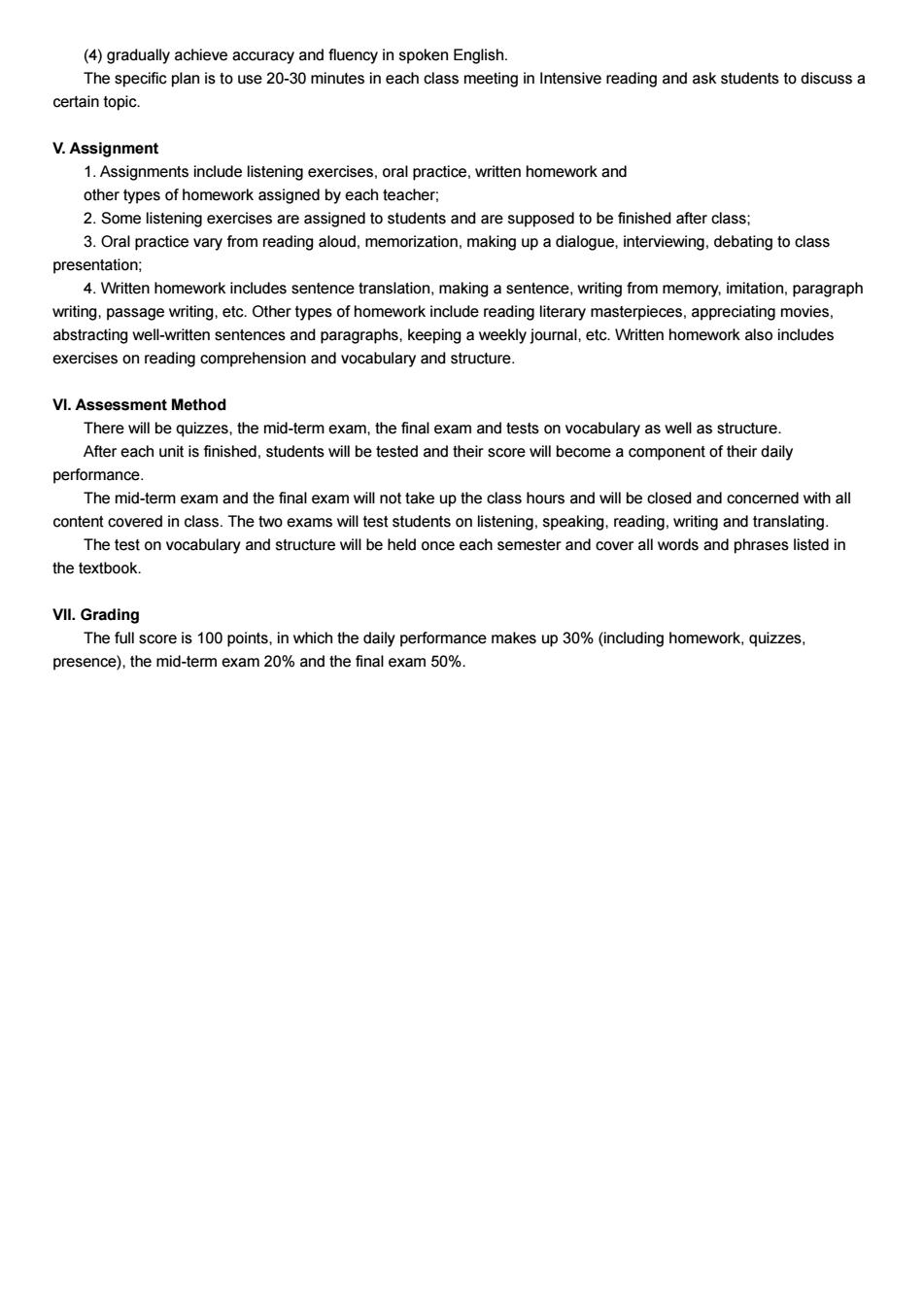
(4)gradually achieve accuracy and fluency in spoken English. The specific plan is to use 20-30 minutes in each class meeting in Intensive reading and ask students to discuss a certain topic. V.Assignment 1.Assignments include listening exercises,oral practice,written homework and other types of homework assigned by each teacher; 2.Some listening exercises are assigned to students and are supposed to be finished after class; 3.Oral practice vary from reading aloud,memorization,making up a dialogue,interviewing,debating to class presentation; 4.Written homework includes sentence translation,making a sentence,writing from memory,imitation,paragraph writing,passage writing,etc.Other types of homework include reading literary masterpieces,appreciating movies, abstracting well-written sentences and paragraphs,keeping a weekly journal,etc.Written homework also includes exercises on reading comprehension and vocabulary and structure. VI.Assessment Method There will be quizzes,the mid-term exam,the final exam and tests on vocabulary as well as structure. After each unit is finished,students will be tested and their score will become a component of their daily performance. The mid-term exam and the final exam will not take up the class hours and will be closed and concerned with all content covered in class.The two exams will test students on listening,speaking,reading,writing and translating. The test on vocabulary and structure will be held once each semester and cover all words and phrases listed in the textbook. VIl.Grading The full score is 100 points,in which the daily performance makes up 30%(including homework,quizzes, presence),the mid-term exam 20%and the final exam 50%
(4) gradually achieve accuracy and fluency in spoken English. The specific plan is to use 20-30 minutes in each class meeting in Intensive reading and ask students to discuss a certain topic. V. Assignment 1. Assignments include listening exercises, oral practice, written homework and other types of homework assigned by each teacher; 2. Some listening exercises are assigned to students and are supposed to be finished after class; 3. Oral practice vary from reading aloud, memorization, making up a dialogue, interviewing, debating to class presentation; 4. Written homework includes sentence translation, making a sentence, writing from memory, imitation, paragraph writing, passage writing, etc. Other types of homework include reading literary masterpieces, appreciating movies, abstracting well-written sentences and paragraphs, keeping a weekly journal, etc. Written homework also includes exercises on reading comprehension and vocabulary and structure. VI. Assessment Method There will be quizzes, the mid-term exam, the final exam and tests on vocabulary as well as structure. After each unit is finished, students will be tested and their score will become a component of their daily performance. The mid-term exam and the final exam will not take up the class hours and will be closed and concerned with all content covered in class. The two exams will test students on listening, speaking, reading, writing and translating. The test on vocabulary and structure will be held once each semester and cover all words and phrases listed in the textbook. VII. Grading The full score is 100 points, in which the daily performance makes up 30% (including homework, quizzes, presence), the mid-term exam 20% and the final exam 50%